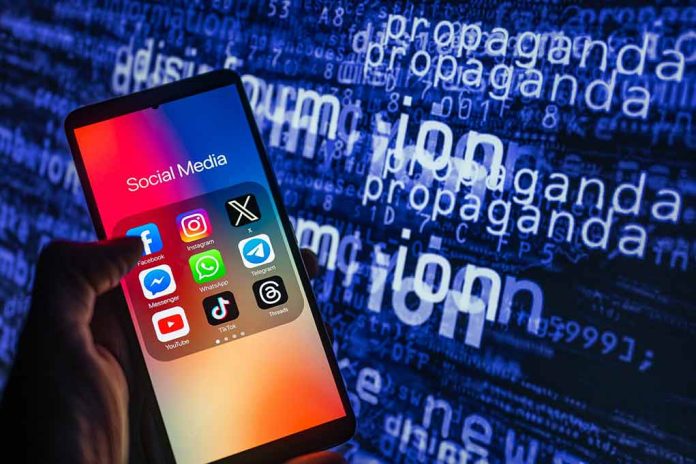
Texas lawmakers are tackling smartphone addiction head-on with bold new legislation requiring app stores to verify users’ ages before allowing minors to download potentially harmful content.
Key Takeaways
- Texas has introduced the App Store Accountability Act, requiring age verification and parental consent for app downloads by users under 18.
- The Texas House passed a bipartisan bill, HB 148,,1 mandating “bell-to-bell no-cell” policies in public schools to limit smartphone distractions.
- Experts testifying before the Texas Legislature highlighted connections between unregulated social media use and serious harms, including addiction, cyberbullying, and exposure to pornography.
- Critics argue that the legislation overlooks the importance of teaching digital literacy and may be difficult to enforce without compromising privacy.
- Some Texas school districts have already implemented cell phone restrictions, reporting improved student engagement and mental health.
Texas Takes Aim at Digital Addiction
The Texas Legislature is moving decisively to address growing concerns about smartphone addiction among children. Through multiple legislative initiatives, lawmakers are responding to mounting evidence that excessive screen time is harming children’s development, education, and mental health. The joint committee hearing on the effects of social media on minors revealed troubling connections between unregulated digital access and serious issues, including cyberbullying, pornography exposure, and dangerous online challenges targeting vulnerable youth. These hearings included testimonies from experts, advocates, and families who have experienced the devastating consequences of unregulated technology use firsthand.
“We can no longer tolerate this as a society… If [these tech companies] can create it, they can prevent it. Come with solutions, or we’ll come up with solutions you won’t like,” state Sen. Lois Kolkhorst.
App Store Accountability Act Targets Big Tech
Senate Bill 2420, introduced by Senator Paxton, seeks to codify the App Store Accountability Act, placing responsibility on app store providers like Google and Apple to prevent minors from accessing addictive and harmful digital services. The act requires these tech giants to implement age verification systems similar to ID checks for purchasing restricted products in physical stores. Federal Communications Commission Chairman Brendan Carr has described app stores as “the single choke point” in the digital ecosystem, making them the logical place to enforce protections for children. This approach targets the gatekeepers who currently profit from children’s app usage without taking responsibility for protecting them.
“It’s like arguing over the age kids can use a community swimming pool—but not bothering to teach them how to swim”. Stated in Psychology Today.
Critics of the legislation argue that age verification methods like ID uploads and facial recognition raise significant privacy concerns. They also point out that determined children can easily bypass such restrictions, creating enforcement gaps. Many experts advocate for a more comprehensive approach that would involve parents, schools, policymakers, and tech companies in promoting digital literacy rather than simply restricting access. Without teaching children how to navigate online spaces safely, they may remain vulnerable even with restrictions in place.
Schools Ban Cell Phones During Class Hours
The Texas House has passed a bipartisan bill, HB 1481, requiring all public school districts to restrict students’ cell phone use during school hours. The legislation mandates “bell-to-bell no-cell” policies while allowing individual districts flexibility in implementation. Exceptions are included for health monitoring devices and special education needs, ensuring that necessary medical and educational accommodations remain available. This balanced approach acknowledges legitimate uses of technology while addressing the overwhelming evidence that unrestricted cell phone access is undermining education.
“Recent research from the American Medical Association’s Adolescent Health Journal shows that young students spend an average of 1.5 hours on smartphones during the 6.5-hour school day,” said State Sen. Brandon Creighton.
Testimonies supporting the school cell phone ban included heart-wrenching stories from parents, students, and educators. Maurine Molak, co-founder of David’s Legacy Foundation, spoke in favor of the bill, referencing her son’s suicide due to cyberbullying that occurred via smartphone. Other testimonies emphasized how constant digital distractions have decimated students’ attention spans, reduced empathy, and undermined classroom learning. Some Texas districts, including Richardson and Keller, have already implemented successful cell phone restrictions, providing real-world evidence that such policies can work.
A Generational Opportunity
The legislative push represents a significant conservative victory in pushing back against Big Tech’s unchecked influence on children. For too long, tech companies have profited from addictive products marketed to minors while parents and educators have struggled with the consequences. These measures seek to restore parental authority and protect children’s developing minds from harmful influences. While critics argue that the laws may be imperfect, supporters see them as necessary first steps in addressing a crisis that is robbing an entire generation of normal childhood development.
“This bill is probably one of the most important bills we’re going to pass this session, because this can free up a whole generation of students,” said State Sen. Paul Bettencourt.
Under President Trump’s leadership, conservatives nationwide are increasingly recognizing the importance of protecting children from predatory technology. The Texas legislation represents one of the most comprehensive state-level approaches to date, combining school restrictions with requirements for tech platforms to verify ages. As other states watch Texas’s bold experiment, similar legislation may soon spread across the country. For parents increasingly desperate to reclaim their children’s attention and development from smartphone addiction, these measures can’t come soon enough.













